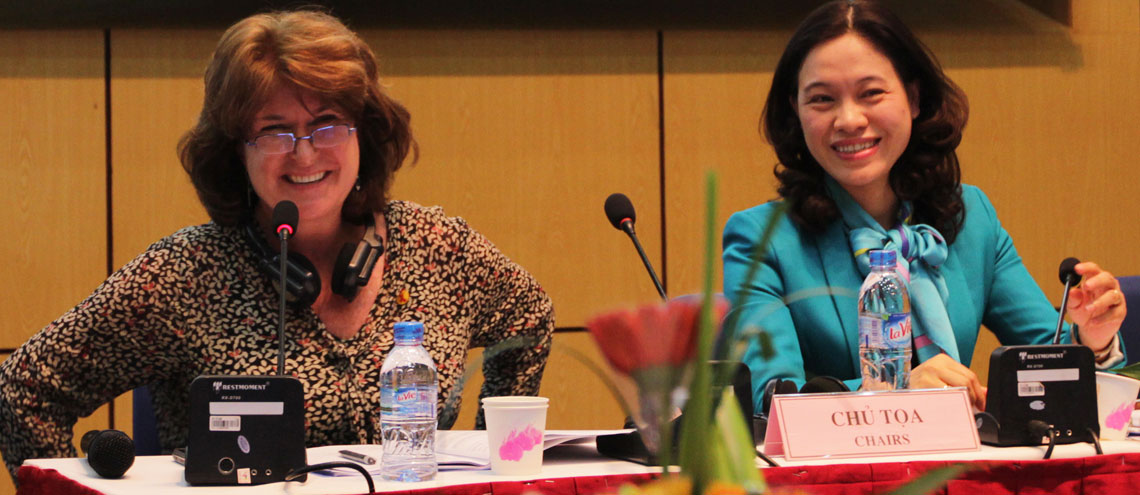Consultation Workshop with pharmaceutical companies on ARV procurement and local production
15th May 2014
Mr. Nguyen Tat Dat, Vice Director of the Drug Administration of Viet Nam;
Dr. Bui Duc Duong, Vice Director of the Viet Nam Administration for AIDS Control;
Distinguished representatives of local and foreign pharmaceutical companies in Viet Nam;
Colleagues and friends:
One priority of the Joint United Nations Programme on HIV/AIDS (UNAIDS) is to facilitate access to high quality and affordable antiretroviral medicines (ARVs). This is about providing the life-saving treatment to all people living with HIV in need. It’s also about the strategic use of antiretroviral treatment for the prevention of HIV transmission.
UNAIDS is proud to support the development of a national plan to ensure sustainable ARV supply in Viet Nam, together with WHO and other development partners. I am very excited to be here with you today, to explore how the pharmaceutical industry can work with the Government to sustain the supply of quality and affordable ARVs in the future, when Viet Nam will have to finance the bulk of ARV need with domestic funds.
This is not an easy task. Viet Nam cannot do yet international bidding for medicines procured by domestic funds. Big international pharmaceutical companies who are not registered in Viet Nam haven’t been able to participate in the national bidding in order to get the most competitive prices. Most local pharmaceutical companies haven’t got WHO pre-qualification certification for ARVs, and cannot participate in international ARV bidding. This narrows the market for locally produced ARVs and makes it difficult to bring down production cost. These are only a few of challenges that we face, but they are not insurmountable.
In view of the challenging task of ensuring ARV security for people living with HIV in Viet Nam over the longer term with domestic funds, we must put the health and well-being of the people of Viet Nam at the heart of the discussion and reflect this in decision making. Those HIV+ people who take these drugs require a sustained and consistent supply for the rest of their lives: without the drugs, they will die. If seeking a way to procure these vital ARVs on the international market means a sustained supply of cheaper and high quality ARVs for all people who need it in Viet Nam, let’s do it! Meanwhile, work can be done on assuring that local ARV manufacturing capacity meets international standards, so that ultimately Viet Nam can become self-sufficient in the production of these life-saving drugs.
I would also like to take this opportunity to express my great appreciation of the leadership of VAAC and DAV in sustaining the supply of high quality and affordable ARVs for Viet Nam. The two Departments of the Ministry of Health have worked very hard together in 2013 to identify potential solutions to overcome challenges, and today’s consultation is a significant step forward.
It is clear that the Government and the local pharmaceutical business sector both play very important roles and need to join hands to ensure ARV security for people living with HIV in Viet Nam for the medium and long term future.
The question is how to create an optimally enabling legal and policy environment, with effective policy tools, to make that happen.
Colleagues and friends,
It is not my place to provide advice regarding the specific revision or development of any legal or policy documents, or to propose specific technical arrangements for effective ARV procurement and local manufacturing in Viet Nam. All of you in this room have the best expertise in this area in the context of Viet Nam, and therefore are best placed to advise the Government. I would only like to share one piece of international experience in this regard, to inform our discussion.
Middle-income countries that are using domestic resources to provide high quality and affordable ARVs to their people, such as Brazil and Thailand, are all making good use of the flexibilities available in the World Trade Organization’s Agreement on Trade-Related Aspects of Intellectual Property Rights. These are usually referred to as “TRIPS flexibilities” and the commonly used tool is the compulsory license.
Compulsory licensing allows for the importation of affordable ARVs when the Government cannot negotiate good prices with a drug patent holder. Compulsory licensing also allows the manufacturing of generic ARVs in country when local production capacity has been built.
I understand that TRIPS flexibilities are already integrated in Viet Nam Intellectual Property Law, and the Ministry of Health is developing guidance on the use of compulsory licenses for pharmaceutical products. This is good news!
I would like to end on this note, and by re-emphasizing that Viet Nam needs to retain and make the best use of all TRIPS flexibilities. It is essentially a question of protecting the right to health of people living with HIV in particular, and of all Vietnamese people more generally. I believe that this is the ultimate goal of all of our work.
I very much look forward to the presentations from the experts who are with us today, and to a vigorous and fruitful discussion on these important issues.
Xin cam on va chuc suc khoe!




